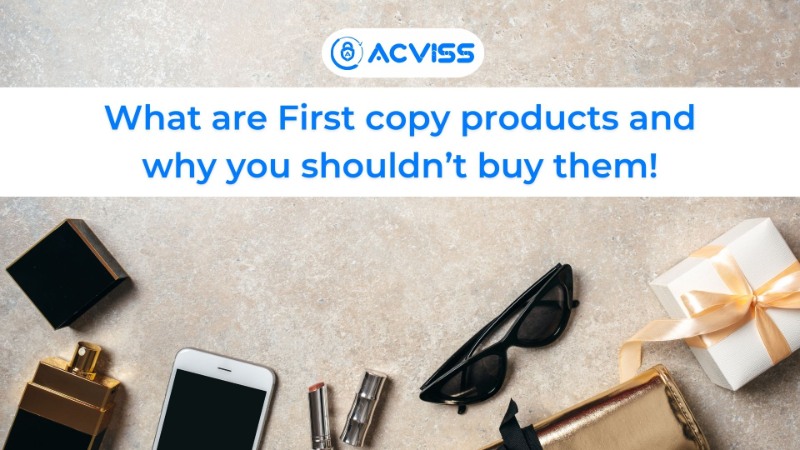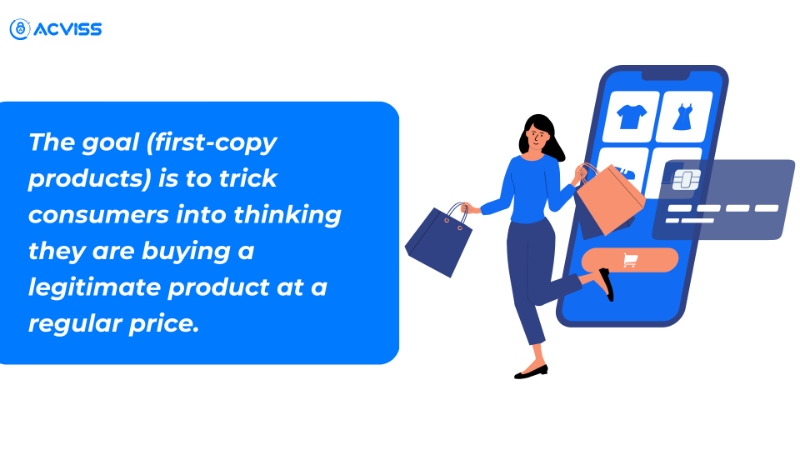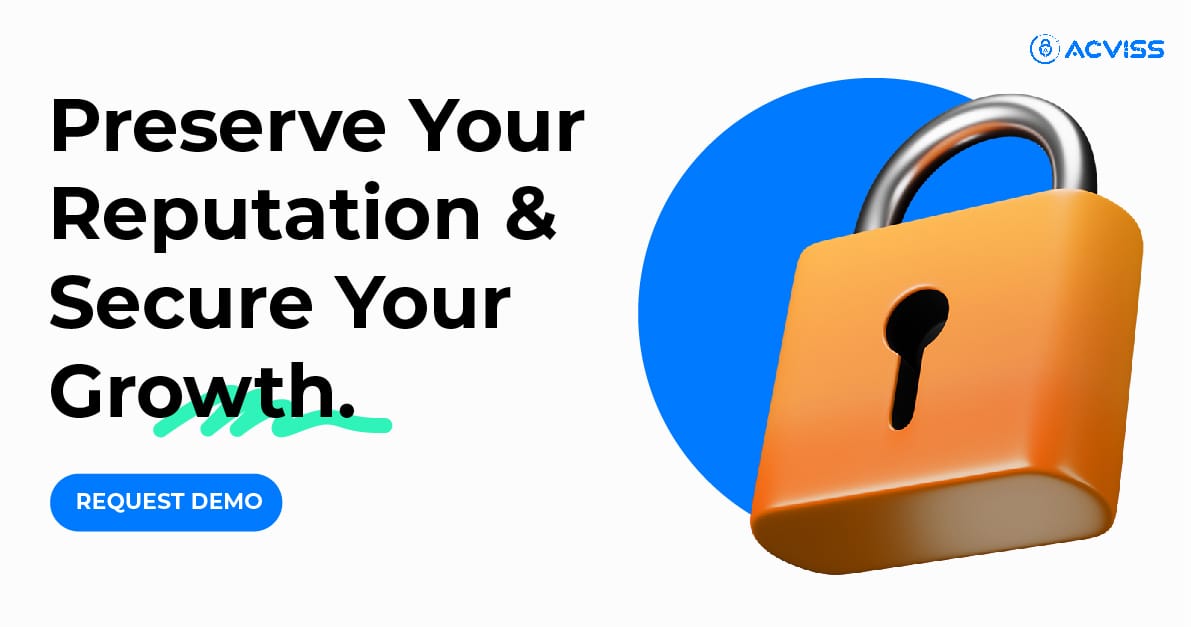What are First Copy Products and Why You Shouldn’t Buy Them!

What if you could get the latest Nike shoes or premium Rolex watch at half the price or even lower? You should definitely say no. Because they are never the original product. These are often termed as First-copy products and it is something that can be used to fool consumers into believing they are buying a real, authentic product at a regular price.
The problem with these products is that they often have no purpose other than to create revenue for the manufacturer and nothing but trouble for the consumer. In most cases, they are illegal, which makes it even worse when you’re caught selling them.
What do first-copy products mean?
First-copy products are just sugar-coated names for cheap knock-offs. These look very similar to the point an ordinary customer wouldn’t be able to find the difference. They are made with materials of substandard quality and will never perform the same as the original. The goal is to trick consumers into thinking they are buying a legitimate product at a low price. And you can definitely see a lot of them in online stores and offline even though they are completely illegal to sell.
Unfortunately, first-copy products have a bad reputation among retailers and brands. Without realizing this, the consumer may assume that the product is genuine, which can lead them to make poor purchasing decisions.
There are different sets of replicas. Some of them are first-copy products, second-copy products and then there are 10A and 7A replicas which are counterfeits of the highest quality. Such products and their quality vary according to the price they hold. But still, they are all counterfeit copies that do not hold any legal existence.
Why First-Copy Products are Illegal?
The primary reason is that these are not manufactured by the brands but made by counterfeiters who are trying to get the money mimicking the name. However, a manufacturing business can take inspiration from a brand and make a product that can look the same but should not use the same brand name or logo. But this is not the case in first-copy products. These products are said to have the same design, colour or even weight and will use the same brand name and logo. And this is illegal across the world.
Just because it looks the same, weighs the same and has the same logo and name, the product need not be an original.
These first-copy products can damage the image of a brand or product name. Most consumers may be tricked into believing they are buying a genuine product when they are not. This is the worst thing that can happen to any business. If a store is selling first-copy products, most probably they are encouraging shady sales practices. Consumers should be careful about where they buy their items and how much they spend.

How to Spot a First Copy Product
First-copy products are easy to tell apart from real products.
- One way to do this is to listen to the product and examine the quality of the materials used. If the product feels or looks cheap, then it is less likely to be genuine.
- Another way to tell if an item is a first copy is through thorough research. If you see an item that looks almost like the original, but with slight differences, then it is possible that the item is not genuine.
- Some of the most counterfeited products are watches and footwear, When it comes to identifying fake watches look at the detailing and the mini-dials, if they are present, check whether they perform well.
- While checking the footwear or dressing wears, give close attention to the stitching, if they are even throughout the material, it may be a standard product. But if they are uneven then that’s a big red flag.
When you need to verify a product if it's a first copy, the best thing you can do is to compare it with an image of the original product.
If you do this, you will be able to spot first-copy products a lot easier than if you were just looking for products in general.
How First Copy Products Can Kill Businesses
First-copy products are dangerous, not only for the consumer but also for the brands. Because they are manufactured illegally, they are often sold at a significantly lower price than the original. As they are not sold at the same price, they are not liable to pay the same tax the brands pay. They won’t have the same quality the original does and can become defective very easily.
Customers who cannot identify the difference will fall victim to the fraud. Unaware, the blame will fall upon the brand itself, damaging its reputation and goodwill. The consumer may think that the product is genuine and that it is worth the price they pay. What the consumer does not know is that it is actually not the original product.
Overall, first-copy products are dangerous. Although it may seem like a sweet offer, they won’t give the great experience the brand promises. Buying a fake copy is not only doing you a disservice but an injustice to the whole world as well. Most times first copy manufacturers employ child labourers and provide terrible working conditions. The money they make from such products is often passed on to drug, weapon trafficking terrorist organisations or other illegal activities. So being more cautious while buying can take you a long way.
Manufacturers and Brand Owners, Let Us Protect Your Integrity Against Imitation!
In a world inundated with the risks of counterfeit products, ensuring the authenticity of your brand becomes paramount. At Acviss, we understand the gravity of the first-copy menace and its detrimental impact on both consumers and genuine brands. Our cutting-edge solution, Certify by Acviss, stands as a formidable guard against the proliferation of counterfeit goods. With Certify, brand owners can fortify their products, ensuring consumers receive the genuine quality they expect.
If your brand is under the looming threat of being replicated as a "first copy," reach out to us. We're here to provide a robust shield against counterfeiting, safeguarding your brand's integrity and ensuring consumers receive the authentic experience they deserve. Don't let your brand be a victim; let Certify be your safeguard against counterfeiting.
FAQs
How Does Certify Safeguard Against Counterfeiting?
Certify utilizes advanced technologies like blockchain and AI, creating an impenetrable shield against counterfeit threats. Explore our multi-layered approach to secure your brand.
What Sets Certify Apart in the Anti-Counterfeiting Landscape?
Certify stands out with its patented processes, offering unique, non-cloneable hologram labels embedded with 2D and 3D codes. Dive into the specifics that make Certify a cutting-edge solution.
How Can Certify Elevate Brand Integrity?
Certify not only detects counterfeits but empowers your brand by providing real-time product verification through mobile application and also provide integrations with Top ERP software a such as SAP, Oracle etc.
Which Industries Can Benefit from Certify's Solutions?
Certify's versatile solutions cater to a wide range of industries,
Pharmaceuticals, Footwear, Agriculture, Alcohol, Electronics, Automobiles, Apparel, Cosmetics, Food and Beverages, Certificates, Tools and Machinery, Watches. Certify's anti-counterfeiting solutions have a positive impact across diverse sectors.
Is Certify Tailored to My Brand's Unique Needs?
Certify's strength lies in its adaptability. Learn how we customize our solutions to suit the specific anti-counterfeiting requirements of your brand, ensuring a personalized and effective defence strategy.
